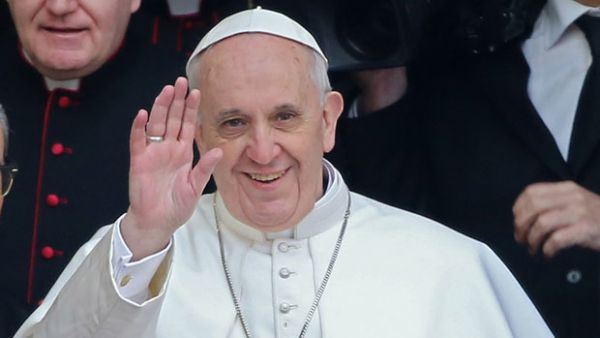Strange Notions
 |
| (Image credit: PopeResigns.net) |
Yesterday, the Internet buzzed about some recent remarks from Pope Francis. A headline at Huffington Post read: "Pope Francis Says Atheists Who Do Good Are Redeemed, Not Just Catholics". A similar Reddit article became yesterday's second most-shared piece.
But was the headline right? Did the Pope really suggest that all atheists are redeemed? And if so, is this a shift in Catholic teaching?
To answer those questions we must first note the Gospel passage Pope Francis preached on when he made the statement, Mark 9:38-40:
"John said to Jesus,
“Teacher, we saw someone driving out demons in your name,
and we tried to prevent him because he does not follow us.”
Jesus replied, “Do not prevent him.
There is no one who performs a mighty deed in my name
who can at the same time speak ill of me.
For whoever is not against us is for us.”"
Jesus' point here is that it's wrong to think people can't do good simply because they aren't Christian. As Pope Francis explained, “This [belief] was wrong...Jesus broadens the horizon...The root of this possibility of doing good—that we all have—is in creation."
From this passage and quote we discover that Pope Francis was primarily concerned with the possibility of goodness, not redemption. But then he continued:
"[A]ll of us have this commandment at heart: do good and do not do evil. All of us. ‘But, Father, this is not Catholic! He cannot do good.’ Yes, he can..."The Lord has redeemed all of us, all of us, with the Blood of Christ: all of us, not just Catholics. Everyone! ‘Father, the atheists?’ Even the atheists. Everyone!...We must meet one another doing good. ‘But I don’t believe, Father, I am an atheist!’ But do good: we will meet one another there."
What should we make of the claim that "The Lord has redeemed all of us...Even the atheists"? Well first, this is nothing new, and therefore hardly "news." The Catholic Church has maintained for two-thousand years that Christ's sacrificial death was for all (cf. 2 Corinthians 5:15 and 1 Peter 3:18.) As the Church teaches in the Catechism of the Catholic Church:
"At the end of the parable of the lost sheep Jesus recalled that God’s love excludes no one: “So it is not the will of your Father who is in heaven that one of these little ones should perish.” He affirms that he came “to give his life as a ransom for many”; this last term is not restrictive, but contrasts the whole of humanity with the unique person of the redeemer who hands himself over to save us. The Church, following the apostles, teaches that Christ died for all men without exception: “There is not, never has been, and never will be a single human being for whom Christ did not suffer.” — (CCC, 605)
However in Catholic thought, Christ's redemptive sacrifice on the Cross is not the same thing as salvation. Salvation is the result of accepting Christ's redemption and applying it to our lives. Catholics know that Christ died for our sins but that we must receive that free gift by trusting in him, accepting his proposal of love, and following him with our life.
So while it's true that Christ redeemed all people, even atheists, that doesn't mean all atheists have accepted this gift or will be saved.
Perhaps an example will help clarify the difference between redemption and salvation. Suppose you destroyed your friend's car causing $10,000 in damage. You're taken to court, and the judge sentences you to five years in prison for the crime. But then I burst in and tell the judge, "My name is Brandon Vogt. I'm this man's friend and I want to pay his penalty. Whatever it costs to fix the car and make things right, I'll pay it." The judge agrees.
Now even though I offer to pay the charge and "redeem" you, you still have a choice. You can either accept my offer and become a free man or you can reject my offer and choose to go to jail. The choice, of course, would be yours.
Christ's redemption of all mankind is analogous to me paying off your $10,000 charge (to "redeem" literally means "to buy back" or "to restore.) Catholics understand that Christ paid the debt for every person, but we still must choose whether to accept that act of redemption—it's not forced on you. You make your choice by whom you give ultimate allegiance: God or yourself, selfless love or self-imposed prison.
Finally, what about the last part of the HuffPost headline? Is it true that all who do good are redeemed? The answer, again, is "Yes" since all people are redeemed by Christ's sacrifice. Whether you live a good life is completely irrelevant to redemption. As Mark Shea writes:
"All who do good, and all who do evil, and all saints, and all Nazis, and pirates, and Communists and Mormons, Swedenborgians, and Satanists, and plumbers, and students who are getting Fs, and little kids and old coots, and profoundly brain-damaged folk and really brilliant scientists, and tall, and fat, and short people, and Muslims, and atheists, and Jews, and Buddhists and everybody else with a pulse are redeemed. Stalin is redeemed along with St. Damien of Molokai, Jack the Ripper and St Francis of Assisi are both redeemed."
Catholics believe Jesus Christ died for every human being without exception. This redemption has nothing to do with our goodness, and everything to do with God's overwhelming generosity. Redemption is universal, salvation is not. Redemption is a proposal we must accept and salvation is the result.



No comments:
Post a Comment